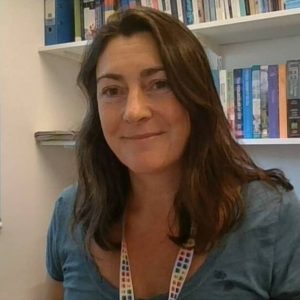Biochemist and problem solver, happy to be working in research again

Jane graduated from her Biochemistry BSc at the University of Sussex in 1996, describing herself as a‘puzzler and problem solver’ by nature. It was during her final year project that she discovered puzzles and problem solving was something you could do as a career and so went on to study for her PhD, starting her research career.
During her PhD Jane met her partner, another academic, and over the next few years they moved, relocating according to each other’s job. In 2010 Jane’s partner took on a permanent role at the University of Plymouth and they decided this would be a good opportunity to settle and start a family. Jane took on a teaching only position while they started a family.
Jane took on a teaching only position while they started a family. On returning to work, Jane met up with her old PhD supervisor who asked her the difficult question “Are you happy?”. Jane realised at this point that while she was happy enough with her life, she did miss research and knew she would be happier if she could return. Jane made the decision to leave her teaching job to care for her two young children and focus on returning to research.
Jane kept in touch with research by attending her partner’s lab meetings with the view to putting together a grant application within the field of mitochondrial bioenergetics. Whilst there, Jane met a Daphne Jackson Fellow who encouraged Jane to apply for a Daphne Jackson Fellowship, highlighting an advertised Fellowship with Kidney Research UK (KRUK). Serendipitously, at that time there was an external lab talk in the department highlighting the role of the mitochondria in kidney disease. This seemed to be the perfect link between Jane’s knowledge and the advertised position with the Daphne Jackson Trust and Jane put together a proposal with the help of the external speaker and the Department at Plymouth. Jane was selected as the preferred candidate by KRUK and was awarded her Daphne Jackson Fellowship in January 2019.
Jane started her Fellowship in March 2019 titled “Mitochondrial biogenesis and cellular bioenergetic function in uraemic myopathy”. On her first day in the lab Jane knew that’s where she wanted to be. During her Fellowship Jane took the opportunity to build up connections within the department, by joining the Athena Swan and Early Career Researcher committees. As the Daphne Jackson Fellowships are retraining Fellowships, Jane realised the importance of focussing on setting up a long-term career alongside research which no doubt contributed to her success both as a Fellow but also in securing a post-Fellowship position.
Having worked through the Covid-19 pandemic, including furlough and home-schooling, Jane started to apply for follow-on positions towards the end of her second year. Being geographically isolated to the south west gave Jane limited options however, the contacts she had built up during her Fellowship put her in a good position to be aware of local opportunities. In January 2021 Jane was offered a Nutrition and Metabolism lectureship at the University of Plymouth which she began immediately after her Fellowship.
Jane valued the opportunity given by the Daphne Jackson Fellowship to meet and hear from other Fellows, particularly at the biannual Daphne Jackson Conference. Jane has also been able to represent the trust and her sponsor, KRUK, at the KRUK conference and online interviews. Finally, Jane described how the Fellowship has given her a sense pride and ownership of her own research project.
